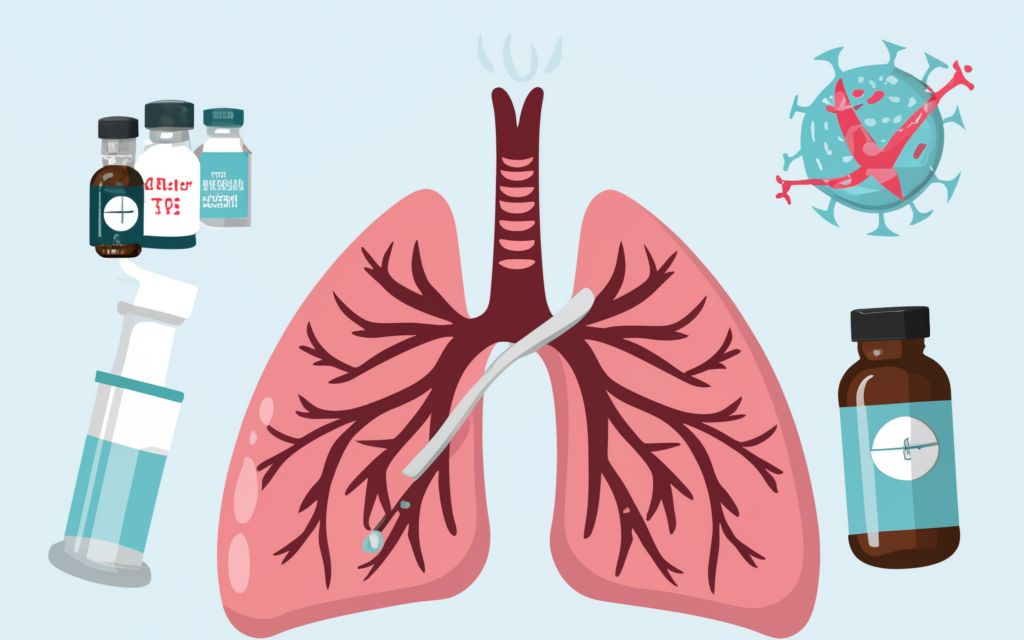Bronchitis, an inflammation of the lining of the bronchial tubes that carry air to and from your lungs, can bring on a cough that wracks your body and leave you feeling breathless. While often caused by a virus and self-resolving, understanding the symptoms, treatment options, and impact on daily life can empower you to navigate this common respiratory illness.
It is a common respiratory condition characterized by inflammation of the bronchial tubes, the airways that carry air to and from the lungs. Understanding the causes, symptoms, diagnosis, treatment options, prevention strategies, and complications of bronchitis is essential for managing the condition effectively.
Bronchitis can be acute or chronic. Acute bronchitis is usually caused by viral infections, such as the flu or common cold, while chronic bronchitis is often linked to long-term exposure to irritants like cigarette smoke or air pollution.
What are 3 symptoms of bronchitis?
Symptoms of bronchitis include coughing (with or without mucus), chest discomfort or pain, fatigue, shortness of breath, and mild fever and chills (more common in acute bronchitis). Bronchitis announces its presence through several tell-tale signs:
- Cough: The hallmark symptom, it can be dry and hacking at first, progressing to producing thick mucus.
- Chest discomfort: A tight feeling or soreness in your chest can accompany the cough, especially with frequent coughing spells.
- Shortness of breath: Due to inflamed airways, you might experience difficulty catching your breath or feeling out of breath with exertion.
Other symptoms like fatigue, mild fever, and muscle aches can also occur, depending on the severity of the infection.
Types of Bronchitis
Acute bronchitis typically lasts for a few weeks and often follows a cold or flu. Chronic bronchitis is characterized by a persistent cough that lasts for at least three months over two consecutive years.

How long does bronchitis last?
While the answer isn’t one-size-fits-all, the good news is that acute bronchitis caused by a virus usually resolves within 10-14 days. The cough, however, can linger for up to 3-4 weeks in some cases. However, if your symptoms worsen or persist beyond this timeframe, consulting a healthcare professional is crucial.
What is the best medicine for bronchitis?
Since most cases of bronchitis are viral, antibiotics are not typically recommended. They only fight off bacterial infections, and using them unnecessarily can contribute to antibiotic resistance. Instead, the focus is on managing symptoms and promoting comfort:
- Over-the-counter cough suppressants or expectorants: These can help ease the cough and clear mucus buildup.
- Plenty of fluids: Hydration helps thin mucus and loosen congestion.
- Rest: Giving your body time to recover is vital for healing.
- Steam inhalation: Using a humidifier or taking hot showers can help loosen mucus and ease breathing difficulties.
If your symptoms are severe, a healthcare professional might prescribe additional medications like inhaled corticosteroids to reduce inflammation.
Diagnosis of Bronchitis
Diagnosing bronchitis involves a medical history review, physical examination, chest X-ray, and possibly sputum culture. Pulmonary function tests may be conducted to assess lung function and rule out other conditions.
Treatment for Bronchitis
Treatment for bronchitis focuses on managing symptoms and addressing underlying causes. Home remedies and self-care techniques, such as rest, hydration, and using a humidifier, can help relieve discomfort. Over-the-counter medications like cough suppressants and pain relievers may also be used. Antibiotics are prescribed for bacterial bronchitis, while bronchodilators and corticosteroids may be recommended for chronic bronchitis.
Prevention of Bronchitis
Preventing bronchitis involves practicing good respiratory hygiene, avoiding cigarette smoke and other respiratory irritants, getting vaccinated against the flu and pneumonia, and managing underlying health conditions.
Complications of Bronchitis

Complications of bronchitis may include pneumonia, exacerbation of underlying lung conditions like COPD, respiratory failure, and chronic bronchitis leading to COPD.
Can I go to work with bronchitis?
Whether you can go to work with bronchitis depends on the severity of your symptoms and your overall health. Here are some factors to consider:
- Severity of symptoms: If you have a high fever, severe shortness of breath, or feel too unwell to function, staying home is crucial to prevent spreading the virus and allow your body to recover.
- Nature of your work: If your job involves close contact with others or requires strenuous physical activity, staying home might be more beneficial for both yourself and others.
- Company policy: Check your workplace’s sick leave policy and recommendations for returning to work after illness.
Living with Bronchitis
Coping with bronchitis involves managing symptoms and seeking medical attention for persistent or worsening symptoms. Smoking cessation programs, pulmonary rehabilitation, and support groups can provide valuable resources and support.
FAQs About Bronchitis:
Is bronchitis contagious?
Yes, acute bronchitis, caused by viruses, can be contagious. The virus spreads through coughs, sneezes, and close contact with infected individuals. However, chronic bronchitis, usually caused by smoking or long-term exposure to irritants, is not contagious.
How long does bronchitis last?
Acute bronchitis typically lasts for 3-10 days, with the cough lingering for a few weeks. Chronic bronchitis can persist for months or even years, with periods of flare-ups and remission.
Can bronchitis turn into pneumonia?
While uncommon, bronchitis can increase your risk of developing pneumonia, especially if you have other health conditions like weakened immunity. Early diagnosis and treatment of bronchitis can help minimize this risk.
Can you die from bronchitis?
While rare, death from bronchitis is possible, primarily in infants, older adults, or individuals with weakened immune systems. Prompt medical attention and proper treatment are crucial to prevent complications.
What is the difference between acute and chronic bronchitis?
Acute bronchitis: Sudden onset, lasts less than 3 weeks, often caused by viruses, usually resolves without complications.
Chronic bronchitis: Persistent cough for at least 3 months in a year, caused by smoking or long-term exposure to irritants, can lead to breathing difficulties.
Can antibiotics treat bronchitis?
Antibiotics are not effective against viral infections, the most common cause of acute bronchitis. However, they might be prescribed if a bacterial infection is suspected. Chronic bronchitis often requires a combination of medications and lifestyle changes.
Is bronchitis more common in smokers?
Yes, smoking is a major risk factor for both acute and chronic bronchitis. Smoking irritates the airways, making them more susceptible to infections and leading to chronic inflammation in chronic bronchitis.
Can bronchitis cause chest pain?
Yes, a persistent cough from bronchitis can strain the muscles in your chest, causing discomfort or pain. Deep breathing exercises and warm compresses can help ease the pain.
Can bronchitis affect children?
Yes, bronchitis is common in children, especially young infants whose airways are narrower and more vulnerable to infections.
Can bronchitis be prevented with vaccines?
There is no specific vaccine for bronchitis. However, vaccines against influenza and pneumococcal pneumonia can help reduce your risk of developing these complications after bronchitis.
Remember, this information is intended for general knowledge and should not be a substitute for professional medical advice. Always consult with a healthcare professional for diagnosis, treatment, and personalized guidance.





